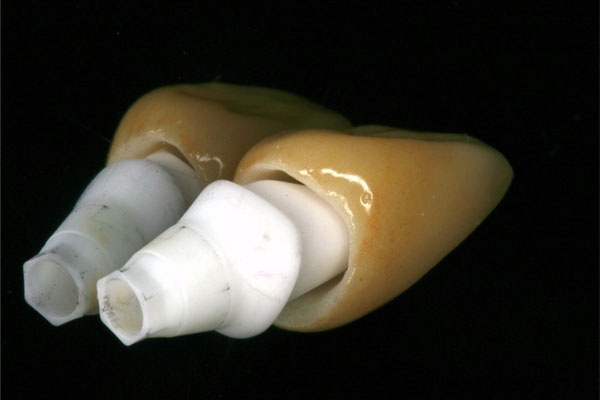All-ceramic single-implant crowns
Can I avoid metals in single-implant crowns? Are all-ceramic crowns reliable on single implants?
Yes. All-ceramic crowns (veneered on alumina, zirconia, lithium-disilicate, or leucite-reinforced and monolithic crowns on lithium-disilicate) can be considered a valid option for restoring single implants (either cemented or screw-retained) both in anterior and posterior locations.
Data from 2,200 crowns with various framework and ceramic veneering configurations was gathered for statistical analysis. Crowns showed a high 5-year survival rate – above 95% – in line with those generally reported for single-implant restorations. After 5 years, chipping occasionally occurred: in veneered alumina 1.8%; veneered glass-ceramics 2.8%; monolithic lithium disilicate 6%; and veneered zirconia 11.3%.
The long-term outcome of all-ceramic crowns is highly dependent on the manufacturing process and clinical handling. It is also recommended that patients be informed of potential technical complications from the outset.
However, the review found that resin-based hybrid ceramic crowns were associated with significantly more core fractures than veneered alumina and zirconia crowns, and the mean 5-year survival rate dropped to 67% with hybrid ceramic crowns. This kind of crown can therefore not be recommended for clinical use. At present, no consensus statement can be made regarding zirconia crowns due to the lack of longitudinal data.
The long-term outcome of all-ceramic crowns is highly dependent on the manufacturing process and clinical handling. It is also recommended that patients be informed of potential technical complications from the outset.
However, the review found that resin-based hybrid ceramic crowns were associated with significantly more core fractures than veneered alumina and zirconia crowns, and the mean 5-year survival rate dropped to 67% with hybrid ceramic crowns. This kind of crown can therefore not be recommended for clinical use. At present, no consensus statement can be made regarding zirconia crowns due to the lack of longitudinal data.

- 1. All-ceramic crowns on single implants can be expected to perform reliably in all indications
- 2. Resin-based hybrid ceramic crowns are not recommended because of high fracture rates at 5-year follow-ups
- 3. Due to lack of longitudinal data, no statement can currently be made concerning monolithic zirconia crowns